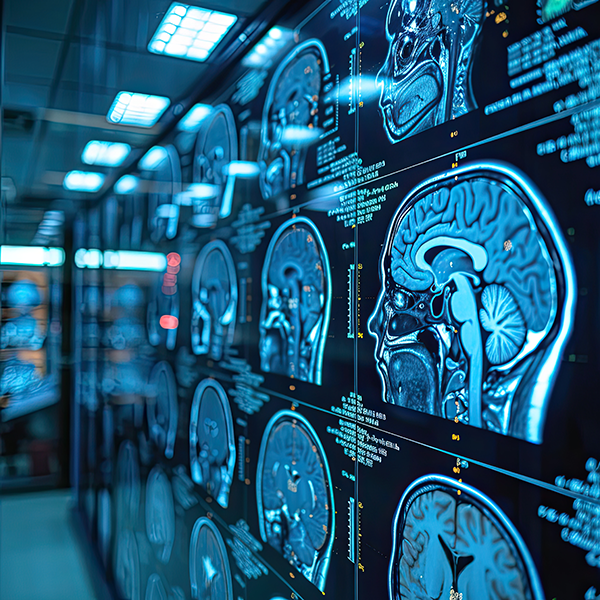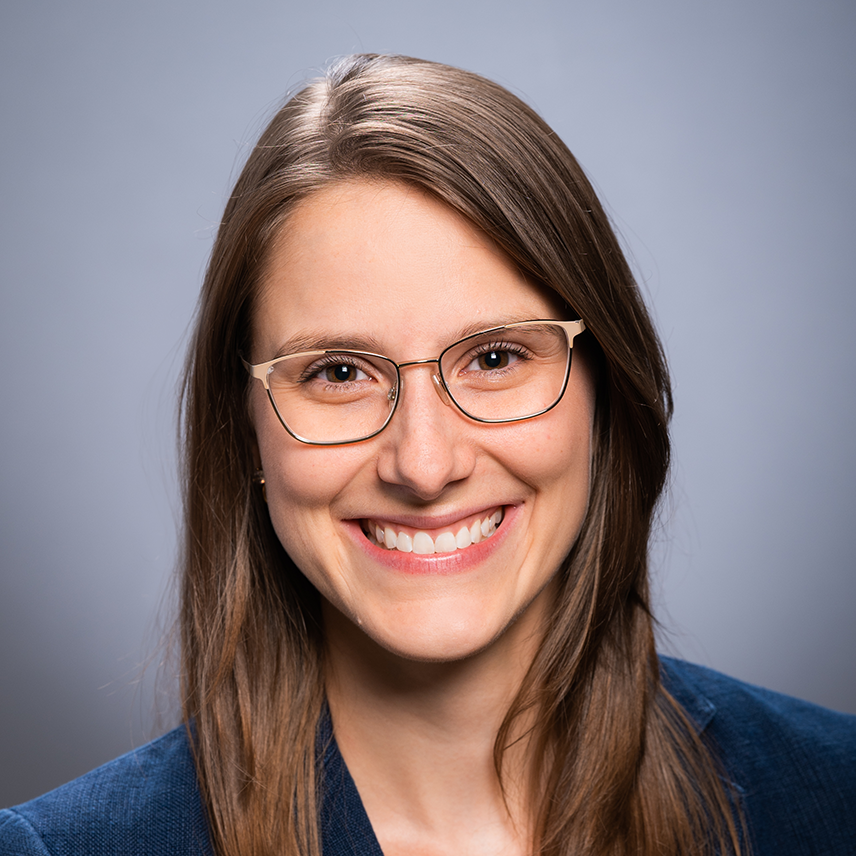Caroline G. Richter, Ph.D., and S. Justin Thomas, Ph.D., have been selected for the 2024-2025 McNulty Civitan Scientist Award.
This award is given on behalf of the McNulty Civitan Scientist Committee and the Civitan International Research Center (CIRC) for neurodevelopment and neurodevelopmental disorders. The purpose of the award is to fund interdisciplinary clinical or fundamental science research aimed at enhancing understanding of typical and atypical brain development, autism spectrum disorders, intellectual disabilities, neurodevelopmental disabilities and malformations, impaired cognitive development, or the effects of environmental toxins on brain development.
The McNulty Award provides $100,000 in funding to any UAB clinical or fundamental study related to neurodevelopmental disorders. For the 2024-2025 cycle, the award was reimagined from a PI grant to an MPI grant to encourage interdisciplinary collaborations across multiple UAB departments.
This team of investigators is studying sleep disorders in individuals with Down Syndrome (DS) with the intention to improve quality of life for them and for their families.
The impact of sleep disorders in individuals with Down Syndrome
Sleep plays a vital role in the human body. It supports metabolic, immune, and cardiovascular health as well as tissue repair and growth, memory, and cognitive performance. It also plays a major role in how an individual regulates emotions and their well-being.
Sleep disorders are a common issue in young individuals with neurodevelopmental disorders, including those with DS. Sleep disorders can affect this population’s academic achievement and emotional well-being, as well as their caregivers. At times, sleep disorders are often undiagnosed and untreated; however, when treated, they involve medications or other therapies (e.g., continuous positive airway pressure [CPAP]), that cause side effects and often have poor adherence.
Richter, an assistant professor in the Department of Psychology and director of the Science of Child Development and Neurodiversity (STARS) lab, states that the inspiration to study sleep disorders in this population came from the impact that sleep disorders have on individuals with DS.
 Caroline G. Richter, Ph.D.Similarly, Thomas, who is an associate professor in the department of Psychiatry and Behavior Neurobiology, became interested in sleep medicine during his early years of undergraduate studies. Thomas worked as a sleep technologist and later participated in a research internship at Brown University. His findings drove him to become a clinician scientist in the field of Behavioral Sleep Medicine.
Caroline G. Richter, Ph.D.Similarly, Thomas, who is an associate professor in the department of Psychiatry and Behavior Neurobiology, became interested in sleep medicine during his early years of undergraduate studies. Thomas worked as a sleep technologist and later participated in a research internship at Brown University. His findings drove him to become a clinician scientist in the field of Behavioral Sleep Medicine.
Richter states that “these sleep problems can be partly attributed to anatomical and physiological factors associated with DS (such as facial and airway structures), health comorbidities of DS (like heart problems), and behavioral and sensory processing challenges linked to DS. This realization, combined with the need for targeted interventions, motivated us to focus on improving sleep health in this group.”
“As Dr. Richter mentioned, obstructive sleep apnea and insomnia are both highly prevalent among individuals with Down Syndrome,” says Thomas. “Furthermore, caregivers' sleep is often also negatively impacted.”
“My research lab, the Disparities in Sleep and Circadian Rhythms Lab, examines the contribution of both sleep and circadian rhythms to a variety of health outcomes with a focus on disparities,” says Thomas. “I've seen firsthand the impacts of sleep disorders on both children and adults with Down Syndrome, as well as their caregivers, and know that research in this area would make a huge impact on many people's lives and may even generalize out to other conditions.”
The study will also work closely with Sylvie Mrug, Ph.D., professor in the Department of Psychology, who’s research examines the interplay of risk and protective factors in the development of behavioral and emotional problems in adolescence, long-term effects of adolescent stress on health in adulthood, and mediating physiological processes.
Improving quality of life with mindfulness-based interventions
To improve the quality of life in this population, the team of researchers will use mindfulness-based interventions. They will focus on Mindfulness-Based Therapy for Insomnia (MBTI) because of the growing evidence in those with intellectual and developmental disabilities (IDD) and their caregivers.
 S. Justin Thomas, Ph.D.“Mindfulness interventions offer a unique advantage over traditional behavioral interventions by fostering a deeper sense of self-awareness and calm, which could be particularly beneficial for improving sleep quality and overall quality of life,” says Richter.
S. Justin Thomas, Ph.D.“Mindfulness interventions offer a unique advantage over traditional behavioral interventions by fostering a deeper sense of self-awareness and calm, which could be particularly beneficial for improving sleep quality and overall quality of life,” says Richter.
Studies have also showed that by incorporating mindfulness techniques, an individual with IDD can see improvements in anxiety, depression, and sleep problems.
Richter, Thomas, and Mrug will develop and test a virtually-administered MBTI protocol that aims to reduce barriers to treatment access, especially in populations of higher health disparities. The study will test this technique on individuals with DS aged 12-30 years in eight sessions over two months.
“Behavioral sleep problems, resulting from a failure to learn satisfactory sleep habits, are frequently ignored in the care of people with DS,” says Richter. But “behavioral interventions have important advantages for addressing sleep problems: they address behavioral causes of sleep difficulties, have no side effects, may improve CPAP adherence, and foster sustainable sleep improvements.”
Richter also states that “behavioral sleep interventions can be successfully implemented remotely in the home, which enhances accessibility and allows for broad dissemination.”
This study will be the first step towards developing and disseminating effective behavioral treatments for sleep problems in individuals with DS and their families.
Expanding impact through partnerships and community
“UAB offers a robust research environment that supports our work through its advanced facilities, interdisciplinary collaborations, and a strong focus on neurodevelopmental disorders,” says Richter. “The collaborative atmosphere and the focus on disability health position us to conduct comprehensive and impactful research in this area.”
Building to this collaborative atmosphere, the Behavioral Sleep Medicine (BSM) Program at UAB provides students with training opportunities to a wide range of patient populations, including those with DS. Thomas, who is director of this program, says they will add a student trainee to conduct clinical rotations to provide additional clinical training and support to their study.
They will also work closely with Snehal Khatri, M.D., from the UAB Down Syndrome Clinic, and Mohini Gunnett, M.D., a clinician at the Sleep Center at Children’s of Alabama.
Thomas, who is also co-director of UAB Sleep and Circadian Research Core, is providing critical infrastructure and expertise in sleep and circadian research. The leadership within the Department of Psychiatry and Behavioral Neurobiology is invested in advancing this area of research.
 Sylvie Mrug, Ph.D.The collaboration extends outside UAB and into the Birmingham community by collaborating with a Community Advisory Board. This includes caregivers of individuals with DS, individuals with DS themselves, The Exceptional Foundation, and Down Syndrome of Alabama.
Sylvie Mrug, Ph.D.The collaboration extends outside UAB and into the Birmingham community by collaborating with a Community Advisory Board. This includes caregivers of individuals with DS, individuals with DS themselves, The Exceptional Foundation, and Down Syndrome of Alabama.
“This partnership ensures that our research is not only scientifically sound but also impactful and directly applicable to the community we serve,” says Richter.
Complementing efforts made through internal awards, Thomas states that the “McNulty Civitan Scientist Award provides researchers with funds to begin highly promising projects that often lead to funding from NIH, PCORI, and other funding agencies.”